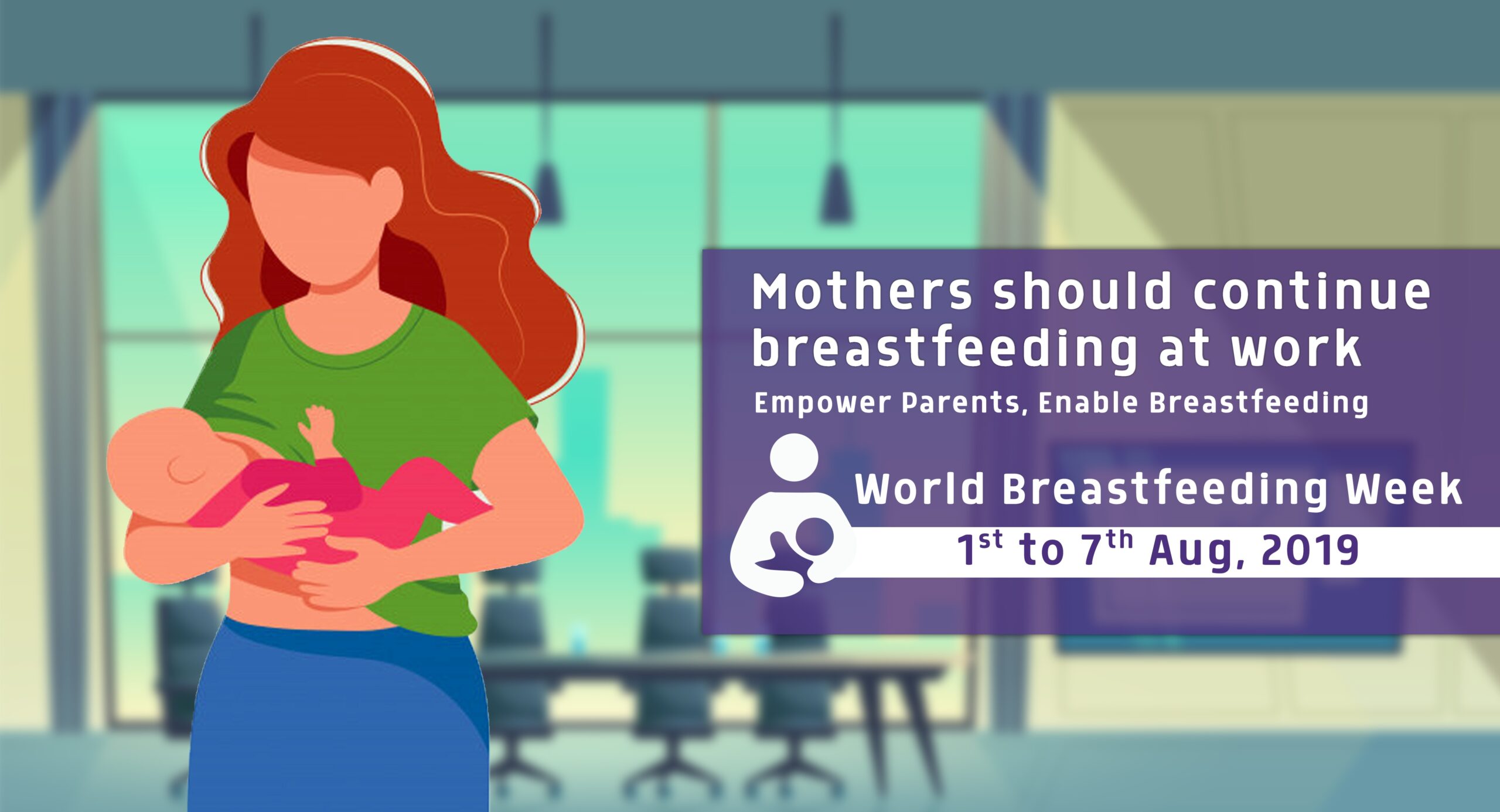
World Breastfeeding Week is from 1-7 August 2019. It is an annual event which highlights the critical importance of breastfeeding for babies across the globe. Breastfeeding can give children the healthiest start in life, and it is one of the simplest and cost-effective ways we have for ensuring that all children survive and thrive.
Breastfeeding is the best and most valuable gift a mother can give to her newborn baby. It is an unparallel way of giving ideal food for the healthy growth and development of babies. It is also an important part of the whole reproductive process, which has vital consequences on the health of mothers. Many scientific studies have proved that exclusive breastfeeding for first 6 months is the finest way of feeding infants. After 6 months, infants should be given complementary foods along with breastfeeding up to 2 years of age or beyond.
According to WHO and UNICEF, the following practices can help mothers establish and sustain exclusive breastfeeding for 6 months:
- Breastfeeding should be initiated within the first hour of childbirth
- Exclusive breastfeeding –infant should only receive breast milk without any additional food or drink, not even water
- Breastfeeding on demand – whenever the child demands, they should be breastfed (day or night)
- No use of bottles, teats or pacifiers
What are the health benefits of breastfeeding for your baby?
Breast milk provides complete and ideal nutrition for newborn babies. It has a perfect mix of nutrients; vitamins, protein, sugar and fat — everything the baby needs for healthy growth. And it is all provided in a form, which is more easily digestible than the formula milk. Breast milk contains antibodies that help your baby fight off infections. It also lowers the risk of having asthma or allergies. Breastfed babies usually don’t become overweight and they gain the right amount of weight. Babies who are solely breastfed for the initial 6 months, without any formula products, have fewer infections, respiratory illnesses, and diarrhoea. Therefore, they have fewer hospital visits. Breastmilk also lowers the risk of diabetes, obesity, and certain cancers as well, but more research is needed. Breastfeeding has also been linked to better brain development and higher intelligence level in children.
How breastmilk improves brain development or intelligence in babies?
Breastmilk has more than 200 favourable components that enhance brain development in babies. The main components are:
1. Docosahexaenoic Acid (DHA) & Arachidonic Acid (ARA):
DHA and ARA are essential fatty acids (EFA), which are the key building blocks for the development of an infant’s brain and vision. Since the human body does not produce EFA in sufficient quantities, infants depend on external sources to obtain these nutrients which are present in breastmilk. DHA primarily improves brain and visual function, while ARA has a role in structuring muscles and maintaining immunity. DHA also promotes brain alertness in babies.
2. Smart Sugars:
Breastmilk is rich in natural sugar, lactose. Lactose breaks down into simpler sugars called Galactose and Glucose. Glucose is the source of energy and metabolism, while Galactose promotes brain and nervous system development in the baby.
3. Proteins:
Proteins are building blocks and have a vital role in various bodily functions. Breastmilk contains proteolytic enzymes that help in breaking down proteins into smaller amino acids, which are easily digested by the baby. Breastmilk also has whey proteins, which act as antibodies and help in fighting infections. Taurine is an amino acid, exclusively present in breastmilk, which plays an important role in eye and brain development of infants.
4. Vitamins and Minerals:
Vitamins and minerals are essential for the overall growth and development of the baby. The most important vitamins found in the breastmilk are vitamin A, D, E, K, C, B6, B12, Folate and more. These vitamins are essential for strong bones and teeth, healthy vision, healthy skin and hair and adequate growth and development of nervous system including nerves, spinal cord and brain.
Breastfeeding in the first one hour of childbirth and exclusive breastfeeding in the first 6 months is the foundation stone for improving the chances of survival of the child, protecting the baby from several life-threatening diseases and for the healthy development of the brain. It improves brain growth and is linked with better educational achievement at the age of 5. Yet, less than half of Indian infants benefit from early breastfeeding and just about half of India’s newborns receive exclusive breastfeeding in the first 6 months. As per National Family Health Survey (NFHS-4) report of the year 2015-16, only 41% children receive breast milk within 1 hour of their birth and only 54% are exclusively breastfed in the first 6 months.
According to Dr. Gurmeet Bhalla, Pediatrician at RxDx, breastmilk plays a vital role in the baby’s brain development from a very early stage of his/her life. It also helps in preventing any neurodevelopmental disorder in your baby. Furthermore, every time a baby is breastfed, it forms a neuro-connection which stimulates optimal brain development. Moreover, breastmilk has rightly been called the “Secret potion for intelligence”. It improves memory development and promotes a higher IQ level in babies. It’s a proven fact that babies who are exclusively breastfed for three months are far ahead in brain quotient over others.
If you or your loved is expecting a baby soon, we recommend you consult a pediatrician or a gynecologist at RxDx Multispeciality Clinic who can not only educate you about the benefits of breastfeeding but also guide you on how to start breastfeeding your newborn.
Compiled By,
Dr Manjari Bansal– Content Writer, RxDx.
Inputs given by,
Mr Ashwani Sinha – Chief Impact Officer, RxDx
For further details, please contact: 080-49261111, 6745-8111
Download RxDx Smart Healthcare App Now!!!



